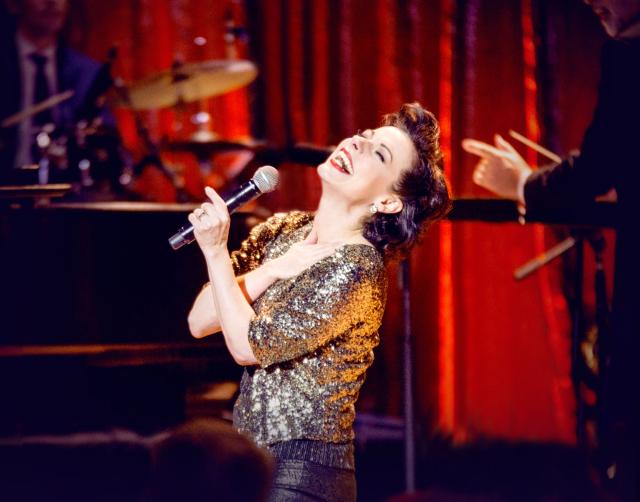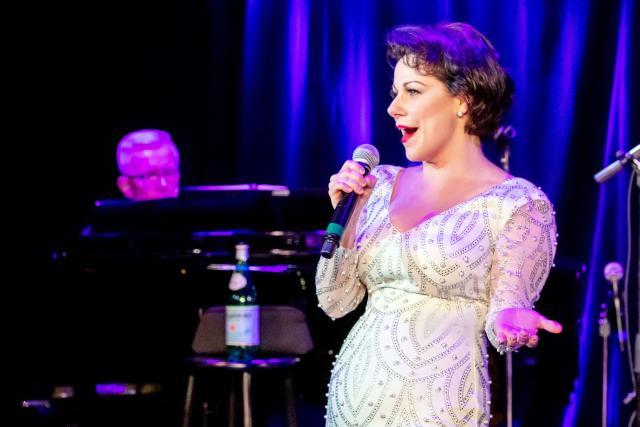

The most surprising thing about this Judy Garland tribute is that the Milwaukee Repertory Theater has taken so long to bring this show to Milwaukee. Get Happy: Angela Ingersoll Sings Judy Garland is a jolly trolley ride from start to finish – at least when “Judy” is singing her hits onstage.
Moreover, the Rep has the perfect venue for this project: the intimate Stackner Cabaret, with its nightclub-style atmosphere that has audiences sitting at small tables in a dark room, with each table lit by a small artificial votive candle. As if to accentuate the lounge vibe, the set consists of nothing more than a solid-black curtain, which is sometimes brightened with a glow of color (lighting by Aaron Lichamer).
Just as Judy Garland would have done in concert prior to her untimely death, Chicago-based actor Angela Ingersoll clutches a wireless microphone and sings directly to the audience. Her numerous songs are interspersed with brief autobiographical snippets about Garland’s life. She also discusses her own life, and the manner in which she eventually became a “stand-in” for Garland.
Ingersoll’s appearance, energy and vocal abilities should please the most demanding Judy Garland fans. Does she have the right look, the right moves and voice? Oh, yes.
Ingersoll has appeared in several productions of End of the Rainbow, a play which chronicles Judy’s final days in London. (Milwaukee Repertory Theater produced this show in its largest theater during its 2013-14 season. It starred the late Hollis Resnick.) Ingersoll’s performances in Rainbow earned her the prestigious Jeff Award in Chicago (2016), and she was named the LA Times Woman of the Year in Theatre. A PBS-TV show featuring Ingersoll as Judy Garland in concert was nominated for an Emmy Award.
Back in the Stackner Cabaret, Ingersoll’s early song, “I Got Rhythm,” is belted out with the power of Ethel Merman, the actor who first made this 1930 Gershwin tune a hit on Broadway. A bit later, Ingersoll enchants with the 1913 Harry James’ ballad, “You Made Me Love You.” Ironically, the song doesn’t particularly describe Garland’s own life, as she had five husbands.
Ingersoll does an excellent job of varying her material. Vibrant, upbeat songs such as “The Trolley Song” are nicely balanced with those that feature a more melancholy tinge. Some of these are “The Man That Got Away,” that Judy Garland sang in the 1954 film, “A Star is Born,” as well as the 1933 classic torch song, “Stormy Weather,” written by Harold Arlen. Ingersoll has no difficulty creating Garland’s deep vibrato.
Instead of stepping away for costume changes, Ingersoll excuses herself and slips into a curtained booth onstage. Her head peeks out so that she can still talk to the audience while changing costumes. The costumes get slinkier and glitterier during the performance. A personal favorite gown is a long white column, which makes Ingersoll look taller. At five feet, she is almost exactly the same height as Garland.
In addition, Ingersoll is a firecracker onstage. Even when a song temporarily switches into instrumental mode, Ingersoll is still clearly into the music. She twirls, shimmies and bobs around the stage as she interacts with the excellent back-up trio.
Two of the players on opening night, pianist Chuck Larkin and percussionist Charles Heath, arrived with Ingersoll from the Chicago area. The bass player, Jeff Hamann, is from Milwaukee. Together, they deliver a joyful, sometimes poignant evening, and anyone who has the slightest interest in Judy Garland should not wait to buy tickets. And when Ingersoll sings “Somewhere Over the Rainbow” near the show’s end, don’t be surprised to find a lump in your throat.
